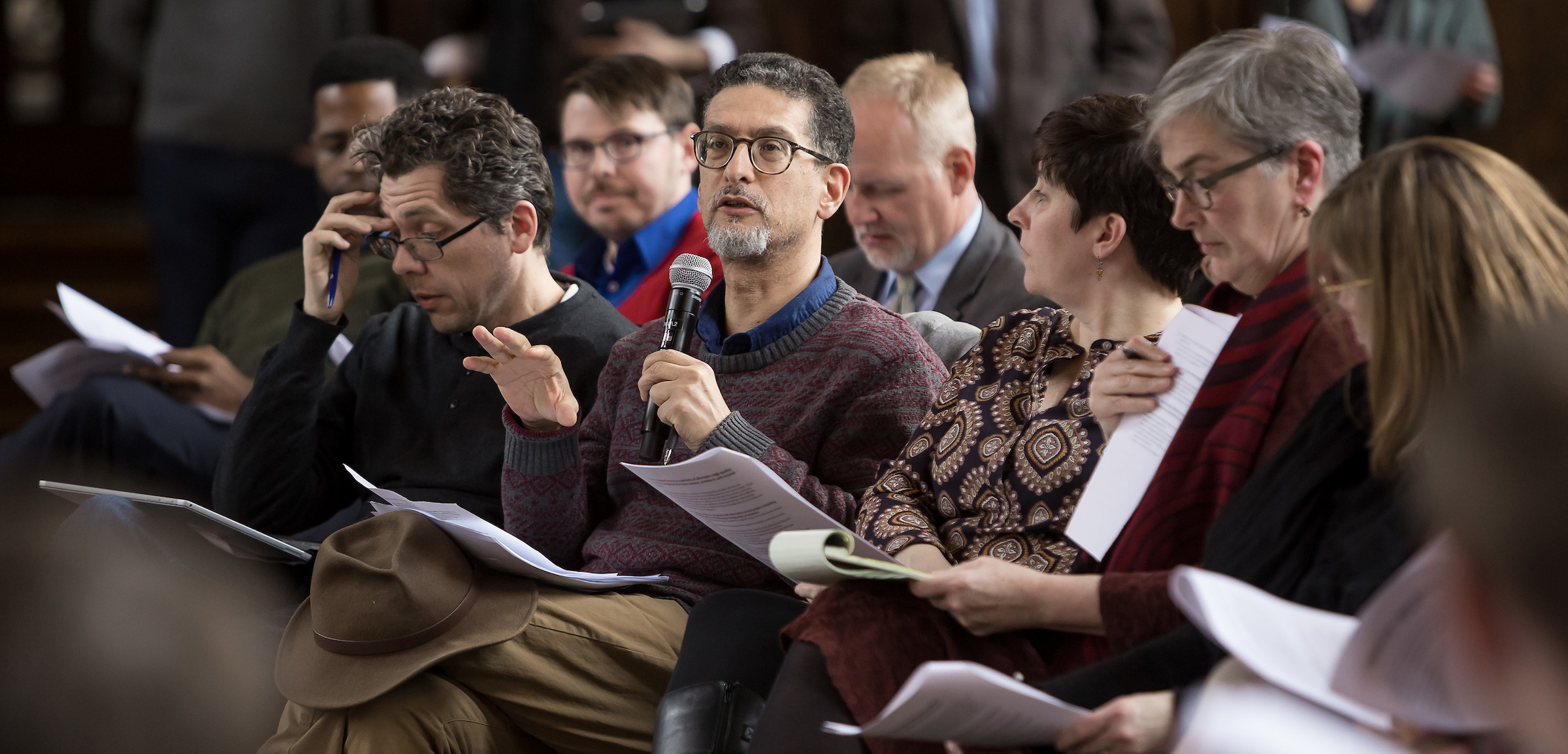 Khaled Keshk, associate professor and chair of Religious Studies, comments during a town hall meeting to discuss a draft of the university's strategic plan. (DePaul University/Jeff Carrion)
Khaled Keshk, associate professor and chair of Religious Studies, comments during a town hall meeting to discuss a draft of the university's strategic plan. (DePaul University/Jeff Carrion)
Two town hall meetings soliciting feedback on the
draft strategic plan attracted standing room only crowds, demonstrating the investment faculty, staff and students are making in envisioning DePaul's future.
Forum participants affirmed the Board of Trustees' call to give mission strategies their own goal, arguing mission is what distinguishes DePaul and should be seen as what informs all other goals. Requests also were made to elaborate on how DePaul's Catholic and Vincentian identity should be further institutionalized as the number of religious Vincentians available to reinforce that identity diminishes.
"The university has discussed catholic with a small c - meaning universal, open and inclusive - but Catholic with a capital C does not mean the opposite," says Mark Laboe, associate vice president for Mission and Ministry. "We have to be more clear about what we mean by Catholic."
The intrinsic value of the liberal arts and the organization of technology services to accomplish the university's business and enhance academic programs and student services were among the top topics of conversation.
Meanwhile, comments about the student experience were wide-ranging. Several people noted that students suffer by being "bounced around" when there is a lack of knowledge about what individual departments do or poor communication between units. Ensuring appropriate student support services in new programs was another concern.
There was a request for more evening and weekend courses for undergraduates and non-traditional students, such as working parents, who cannot take daytime classes. Although online enrollment is growing fast, the university was cautioned about offering certain classes and programs exclusively online because students using veteran benefits cannot be reimbursed for expenses related to online offerings.
Jay Braatz, vice president for strategic planning and presidential administration, chairs the representative Strategic Planning Task Force that assembled the draft plan. She noted that it is the board's responsibility to establish the university's strategic direction based on conditions prevailing in the higher education landscape. She also noted that the board does not do its work in a vacuum, but relies on the wisdom and input of the university community.
"Once strategic direction is set," she says. "It is the job of the university community to implement the plan. It will be up to us to determine what steps we need to take to reach the plan's goals and objectives."
Several applauded the inclusion of an objective to develop students' global citizenry, one participant noting the importance of speaking another language "as a pre-requisite for true cultural agility," and another indicating that religious competency is a critical skill to navigate many cultures around the world.
Diversity strategies attracted comments that touched many corners of the university, from the necessity of people in positions of privilege to become more inclusive of historically marginalized communities to ensuring that an increase in diversity among employees should include hiring in positions of power.
A number of staff members said they felt the role professional staff needed to be articulated more forcefully, particularly since staff will have a major role in achieving the proposed goals. Faculty requested acknowledgement of the increase in contingent faculty and the roles that different types of faculty play. A summary of themes from the town halls can be found here.
Rob Karpinski, associate vice president in Academic Affairs, moderated the Lincoln Park session.
"Many times, what the church teaches and believes comes from the ground up. They were practicing it and living it, and it was part of their reality. Then it became formalized in the church structure," he noted in closing the session. "My sense is that you are living the Catholic, Vincentian mission. You are part of this university, and from your experience will come a strategic plan that we can look at and say 'that is who we are' because that's what we are doing."